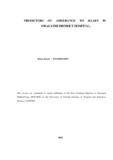| dc.contributor.author | Kiarie, Helen | |
| dc.date.accessioned | 2016-05-19T15:07:11Z | |
| dc.date.available | 2016-05-19T15:07:11Z | |
| dc.date.issued | 2010 | |
| dc.identifier.uri | http://hdl.handle.net/11295/95781 | |
| dc.description.abstract | Adherence to highly active antiretroviral therapy (HAART) medications is critically important for the success of therapy in patients treated for Human Immunodeficiency virus - Acquired Immunodeficiency Syndrome (HIV/AIDS). Successful long-term treatment of HIV/AIDS requires at least 95% adherence to HAART, which, based on a twice a day regimen, translates into missing no more than two doses per month. This high level of adherence is necessary to prevent emergence of drug-resistant HIV variants that lead to regimen failure, and limit options for future therapy. Several factors have been described in various settings as being associated with adherence. These are Psycho-Socio Support, Time on ART, Financial support, Psychosocial and Antiretroviral side effects. Patient factors have been found to be the most important predictors of adherence in most studies.
The impact of unpunctuality for clinic appointments is closely associated with treatment outcomes for HAART. Virologic failure has been shown to occur more quickly in patients with gaps in refilling their medication than those with no gaps, as adherence will often be interrupted when patients run out of medication.
Measurement of adherence was by self report and pill counts based on the last 4 days and one month respectfully. Although it’s important to compare adherence to biological markers, it was not able to corroborate patient self-reported and pill counts adherence with viral loads and CD4 responses in this study due to financial and logistical barriers., Several observational studies however have shown that these measurements correlate well with the plasma HIV RNA, supporting their value in HIV ARV medication adherence studies. | en_US |
| dc.language.iso | en | en_US |
| dc.publisher | University of Nairobi | en_US |
| dc.rights | Attribution-NonCommercial-NoDerivs 3.0 United States | * |
| dc.rights.uri | http://creativecommons.org/licenses/by-nc-nd/3.0/us/ | * |
| dc.subject | adherance to HAART | en_US |
| dc.title | Predictors of adherance to HAART in Mbagathi district hospital. | en_US |
| dc.type | Thesis | en_US |
| dc.description.department | a
Department of Psychiatry, University of Nairobi, ; bDepartment of Mental Health, School of Medicine,
Moi University, Eldoret, Kenya | |



